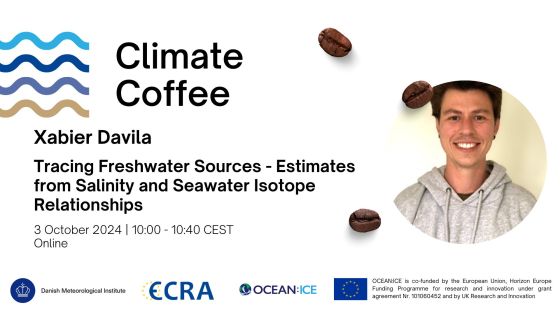Climate coffee with Xabier Davila on Tracing Freshwater Sources - Estimates from Salinity and Seawater Isotope Relationships

Please join us for this Climate Coffee on
Tracing Freshwater Sources - Estimates from Salinity and Seawater Isotope Relationships
Freshwater fluxes from precipitation and sea ice melting can be traced through changes in salinity and oxygen-18 isotopes (d18O). At polar regions, d18O is a powerful freshwater tracer because of the extremely light d18O signal in meteoric water, -i.e., precipitation, that was fixed at the ice sheets. Unlike meteoric water, sea ice meltwater carries a much heavier isotopic signature, and, in combination with salinity, these two freshwater sources can be separated. Here we combine a machine learning approach with an inverse circulation model in a two-step process to reconstruct the meteoric water and sea ice meltwater into the ocean. First, the contribution of these freshwater sources is estimated on available discrete co-located observations of d18O, salinity and temperature. Then, these discrete estimates are assimilated into an inverse ocean circulation model to provide a state estimate of freshwater fluxes into the modern ocean.
Our speaker
Xabier Davila is an oceanographer who specialises in ocean ventilation and researches the transport of tracers through inverse modelling techniques. He is a PostDoc at the Norwegian Research Centre (NORCE) and the Bjerknes Centre for Climate Research. He is involved in the OCEAN:ICE Horizon Europe project where he aims to reconstruct the freshwater fluxes in the Southern Ocean. He holds a PhD from the University of Bergen, where his research focused on reconstructing the origin of the Anthropogenic Carbon reservoir and Oxygen Minimum Zones. His work utilized the Total Matrix Intercomparison (TMI) framework to trace ocean observations back to their surface origins, aiding the understanding of ocean ventilation and subduction processes.
What is a Climate Coffee?
#climatecoffees are short (circa 40 min: 20 min talk + 20 min Q&A), relaxed meetings for scientists to share ideas, discuss methods and communicate new results. They are open to speakers of all levels of seniority, we especially encourage early-career scientists to become a speaker. The Coffees are an exciting opportunity for scientists to build a network and disseminate recent results, peer-to-peer. We invite researchers from across the climate science community to join us for this series of regular online knowledge exchange events.
Links to MS Teams
It will be sent to you with the registration confirmation.
Organisation
The Climate Coffees are organized by the Horizon Europe projects OCEAN:ICE, ObsSea4Clim, TipESM, the Danish Meteorological Institute and the European Climate Research Alliance.
Looking forward to seeing you at this Climate Coffee!
Chiara, Erika (DMI) and Sissi (ECRA)
Sign up for our newsletter:
https://ecra-climate.us20.list-manage.com/subscribe?u=b94f327527c0ce01d605c656f&id=21b1c232e4
Would you be interested in being the next speaker?
Please get in touch with Erika erh@dmi.dk and Chiara chb@dmi.dk
Information about the Event
Date and time Thursday 3. October 2024 at 10:00 to 10:45
Registration Deadline Thursday 3. October 2024 at 09:00
Location Microsoft Teams
Organizer
Danish Meteorological Institute
Phone +45 39157500
NCKF@dmi.dk
Number of attendees: 11
Number of attendees: 11
 Loading
Loading

